Entrepreneurship: Types, Impact, and Business Start-ups Report
VerifiedAdded on 2021/01/02
|19
|4749
|407
Report
AI Summary
This report provides a comprehensive overview of entrepreneurship and small business management. It begins by defining an entrepreneur and then delves into different types of entrepreneurial ventures, including social, scalable, large, small, and trading companies, exploring their characteristics and relationships. The report further examines the similarities and differences between these ventures, highlighting aspects such as ownership, aims, and roles. It also investigates the impact of micro and small businesses on the UK economy, emphasizing their contribution to economic power, employment, and technological advancements. The importance of small businesses and business start-ups is discussed, along with the characteristics and traits of successful entrepreneurs. The report also touches upon entrepreneurial personalities, motivation, and the factors that hinder or foster entrepreneurship, providing a well-rounded analysis of the subject.

ENTREPRENEURSHIP
AND SMALL BUSINESS
MANAGEMENT
AND SMALL BUSINESS
MANAGEMENT
Paraphrase This Document
Need a fresh take? Get an instant paraphrase of this document with our AI Paraphraser
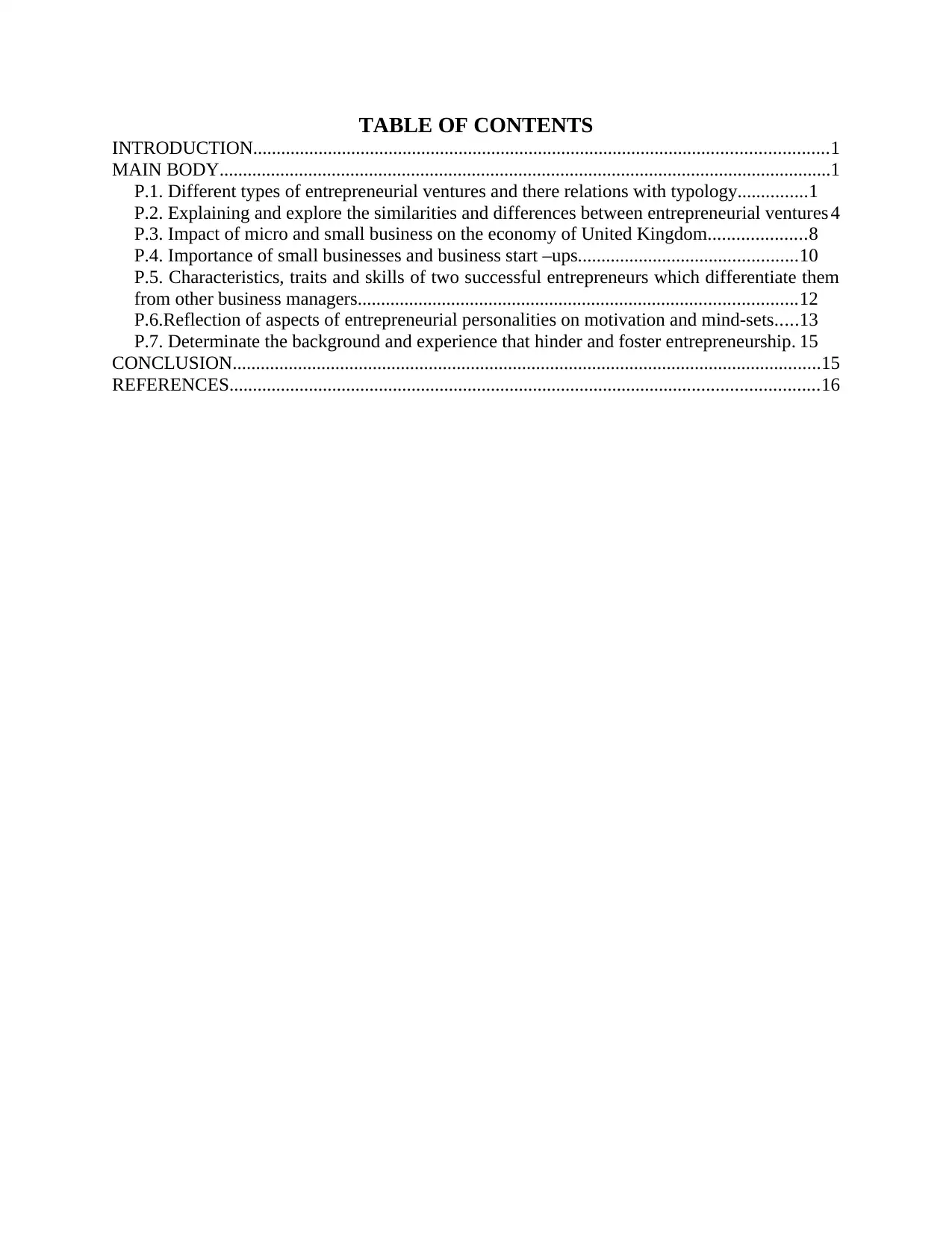
TABLE OF CONTENTS
INTRODUCTION...........................................................................................................................1
MAIN BODY...................................................................................................................................1
P.1. Different types of entrepreneurial ventures and there relations with typology...............1
P.2. Explaining and explore the similarities and differences between entrepreneurial ventures 4
P.3. Impact of micro and small business on the economy of United Kingdom.....................8
P.4. Importance of small businesses and business start –ups...............................................10
P.5. Characteristics, traits and skills of two successful entrepreneurs which differentiate them
from other business managers..............................................................................................12
P.6.Reflection of aspects of entrepreneurial personalities on motivation and mind-sets.....13
P.7. Determinate the background and experience that hinder and foster entrepreneurship. 15
CONCLUSION..............................................................................................................................15
REFERENCES..............................................................................................................................16
INTRODUCTION...........................................................................................................................1
MAIN BODY...................................................................................................................................1
P.1. Different types of entrepreneurial ventures and there relations with typology...............1
P.2. Explaining and explore the similarities and differences between entrepreneurial ventures 4
P.3. Impact of micro and small business on the economy of United Kingdom.....................8
P.4. Importance of small businesses and business start –ups...............................................10
P.5. Characteristics, traits and skills of two successful entrepreneurs which differentiate them
from other business managers..............................................................................................12
P.6.Reflection of aspects of entrepreneurial personalities on motivation and mind-sets.....13
P.7. Determinate the background and experience that hinder and foster entrepreneurship. 15
CONCLUSION..............................................................................................................................15
REFERENCES..............................................................................................................................16
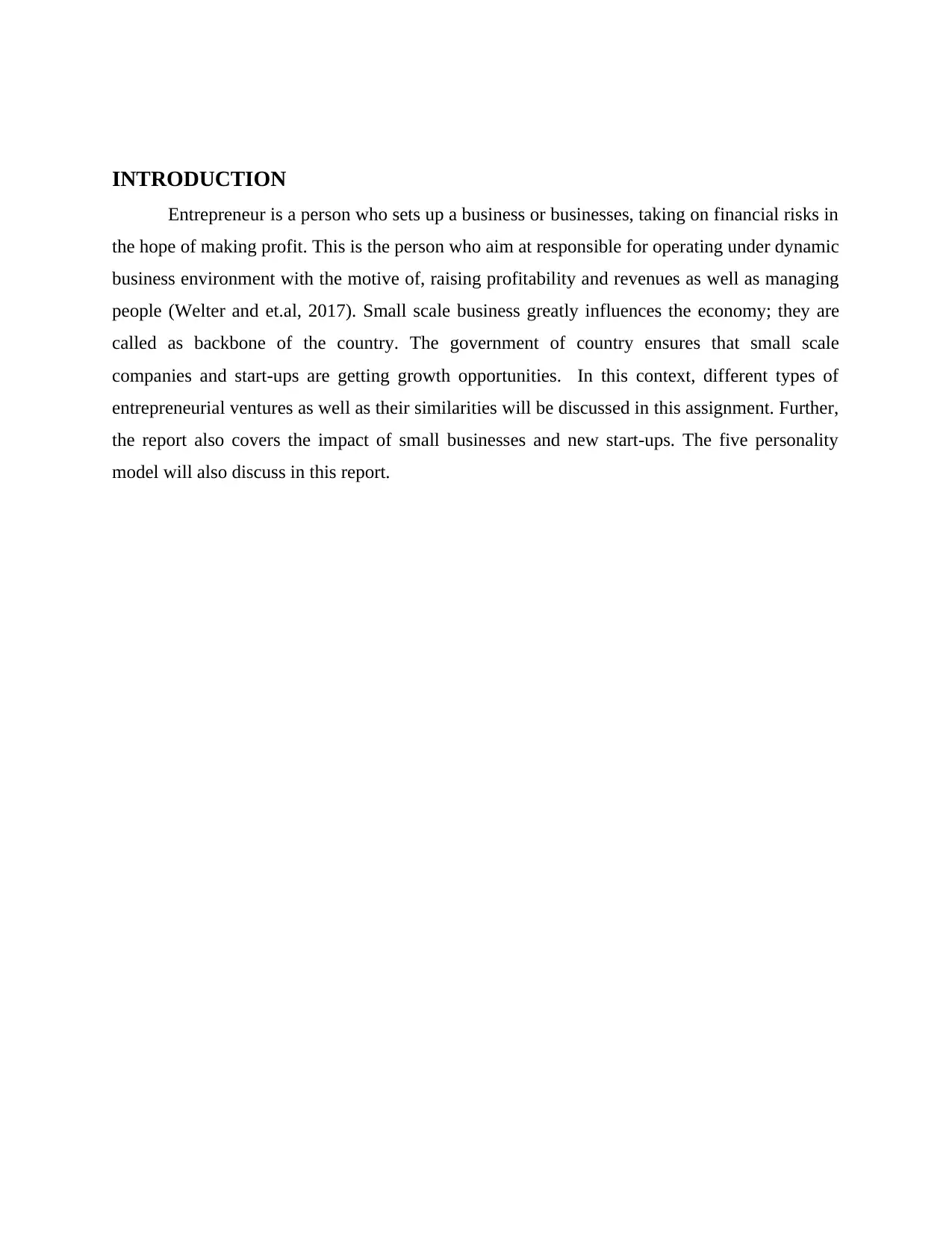
INTRODUCTION
Entrepreneur is a person who sets up a business or businesses, taking on financial risks in
the hope of making profit. This is the person who aim at responsible for operating under dynamic
business environment with the motive of, raising profitability and revenues as well as managing
people (Welter and et.al, 2017). Small scale business greatly influences the economy; they are
called as backbone of the country. The government of country ensures that small scale
companies and start-ups are getting growth opportunities. In this context, different types of
entrepreneurial ventures as well as their similarities will be discussed in this assignment. Further,
the report also covers the impact of small businesses and new start-ups. The five personality
model will also discuss in this report.
Entrepreneur is a person who sets up a business or businesses, taking on financial risks in
the hope of making profit. This is the person who aim at responsible for operating under dynamic
business environment with the motive of, raising profitability and revenues as well as managing
people (Welter and et.al, 2017). Small scale business greatly influences the economy; they are
called as backbone of the country. The government of country ensures that small scale
companies and start-ups are getting growth opportunities. In this context, different types of
entrepreneurial ventures as well as their similarities will be discussed in this assignment. Further,
the report also covers the impact of small businesses and new start-ups. The five personality
model will also discuss in this report.
⊘ This is a preview!⊘
Do you want full access?
Subscribe today to unlock all pages.

Trusted by 1+ million students worldwide
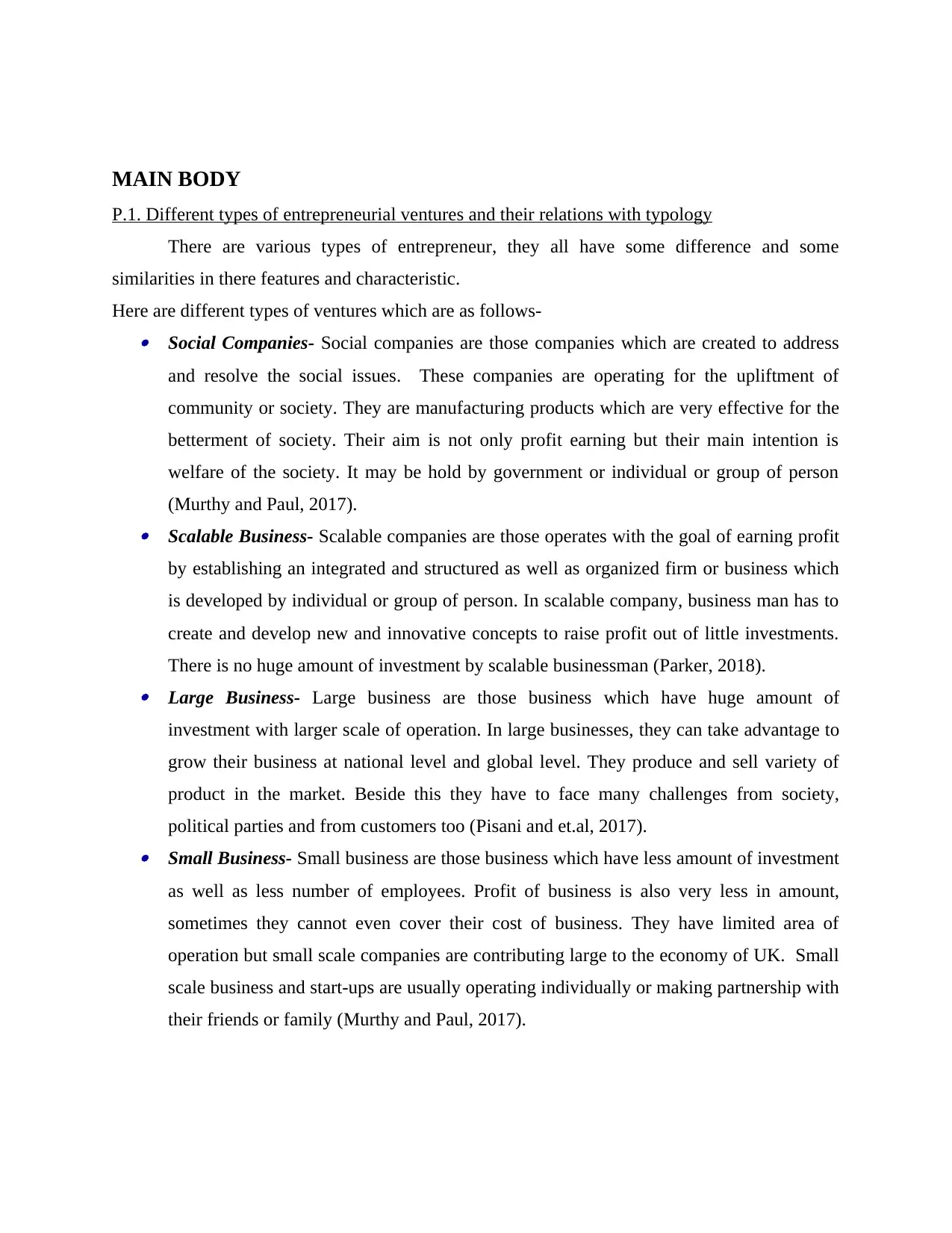
MAIN BODY
P.1. Different types of entrepreneurial ventures and their relations with typology
There are various types of entrepreneur, they all have some difference and some
similarities in there features and characteristic.
Here are different types of ventures which are as follows- Social Companies- Social companies are those companies which are created to address
and resolve the social issues. These companies are operating for the upliftment of
community or society. They are manufacturing products which are very effective for the
betterment of society. Their aim is not only profit earning but their main intention is
welfare of the society. It may be hold by government or individual or group of person
(Murthy and Paul, 2017). Scalable Business- Scalable companies are those operates with the goal of earning profit
by establishing an integrated and structured as well as organized firm or business which
is developed by individual or group of person. In scalable company, business man has to
create and develop new and innovative concepts to raise profit out of little investments.
There is no huge amount of investment by scalable businessman (Parker, 2018). Large Business- Large business are those business which have huge amount of
investment with larger scale of operation. In large businesses, they can take advantage to
grow their business at national level and global level. They produce and sell variety of
product in the market. Beside this they have to face many challenges from society,
political parties and from customers too (Pisani and et.al, 2017). Small Business- Small business are those business which have less amount of investment
as well as less number of employees. Profit of business is also very less in amount,
sometimes they cannot even cover their cost of business. They have limited area of
operation but small scale companies are contributing large to the economy of UK. Small
scale business and start-ups are usually operating individually or making partnership with
their friends or family (Murthy and Paul, 2017).
P.1. Different types of entrepreneurial ventures and their relations with typology
There are various types of entrepreneur, they all have some difference and some
similarities in there features and characteristic.
Here are different types of ventures which are as follows- Social Companies- Social companies are those companies which are created to address
and resolve the social issues. These companies are operating for the upliftment of
community or society. They are manufacturing products which are very effective for the
betterment of society. Their aim is not only profit earning but their main intention is
welfare of the society. It may be hold by government or individual or group of person
(Murthy and Paul, 2017). Scalable Business- Scalable companies are those operates with the goal of earning profit
by establishing an integrated and structured as well as organized firm or business which
is developed by individual or group of person. In scalable company, business man has to
create and develop new and innovative concepts to raise profit out of little investments.
There is no huge amount of investment by scalable businessman (Parker, 2018). Large Business- Large business are those business which have huge amount of
investment with larger scale of operation. In large businesses, they can take advantage to
grow their business at national level and global level. They produce and sell variety of
product in the market. Beside this they have to face many challenges from society,
political parties and from customers too (Pisani and et.al, 2017). Small Business- Small business are those business which have less amount of investment
as well as less number of employees. Profit of business is also very less in amount,
sometimes they cannot even cover their cost of business. They have limited area of
operation but small scale companies are contributing large to the economy of UK. Small
scale business and start-ups are usually operating individually or making partnership with
their friends or family (Murthy and Paul, 2017).
Paraphrase This Document
Need a fresh take? Get an instant paraphrase of this document with our AI Paraphraser
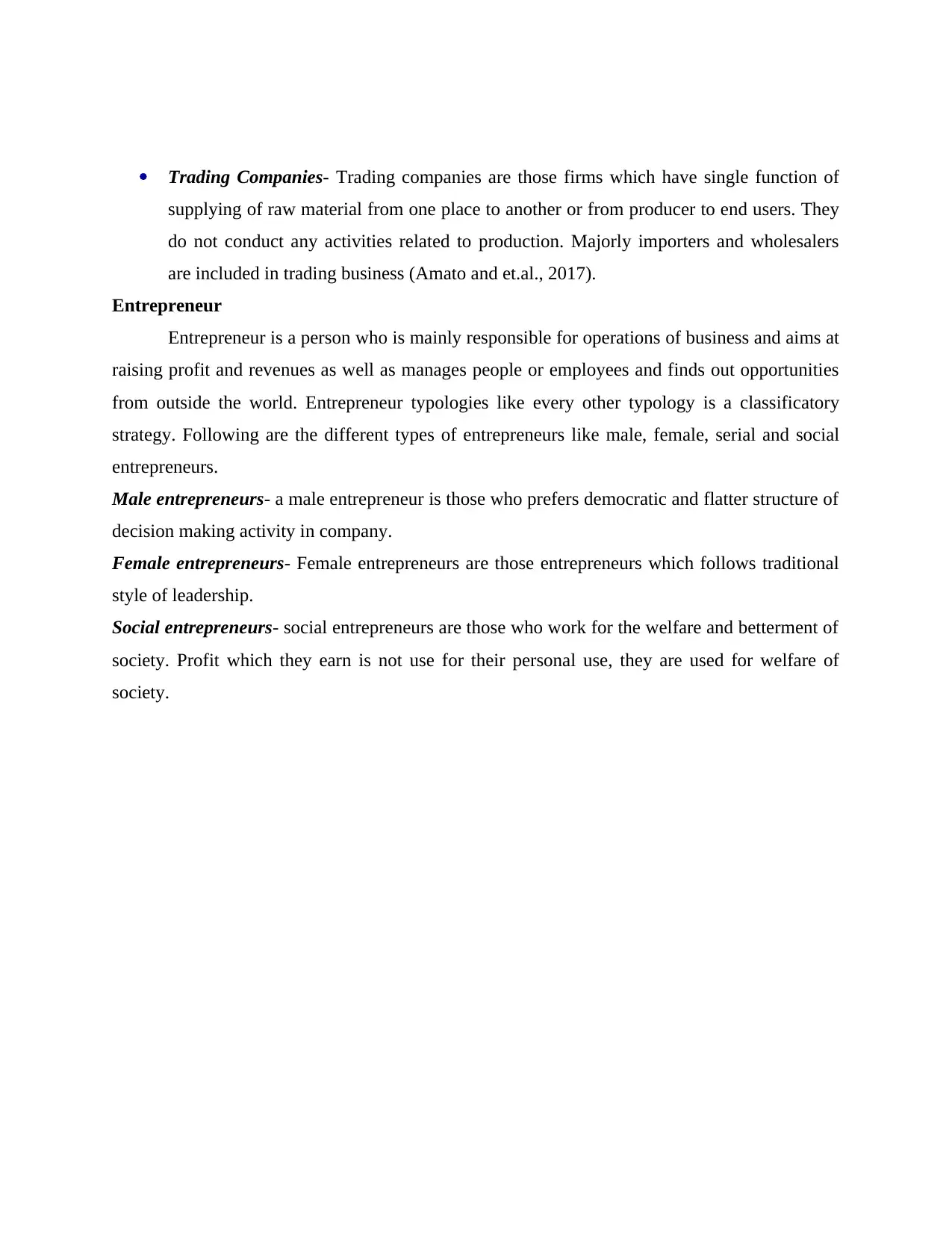
Trading Companies- Trading companies are those firms which have single function of
supplying of raw material from one place to another or from producer to end users. They
do not conduct any activities related to production. Majorly importers and wholesalers
are included in trading business (Amato and et.al., 2017).
Entrepreneur
Entrepreneur is a person who is mainly responsible for operations of business and aims at
raising profit and revenues as well as manages people or employees and finds out opportunities
from outside the world. Entrepreneur typologies like every other typology is a classificatory
strategy. Following are the different types of entrepreneurs like male, female, serial and social
entrepreneurs.
Male entrepreneurs- a male entrepreneur is those who prefers democratic and flatter structure of
decision making activity in company.
Female entrepreneurs- Female entrepreneurs are those entrepreneurs which follows traditional
style of leadership.
Social entrepreneurs- social entrepreneurs are those who work for the welfare and betterment of
society. Profit which they earn is not use for their personal use, they are used for welfare of
society.
supplying of raw material from one place to another or from producer to end users. They
do not conduct any activities related to production. Majorly importers and wholesalers
are included in trading business (Amato and et.al., 2017).
Entrepreneur
Entrepreneur is a person who is mainly responsible for operations of business and aims at
raising profit and revenues as well as manages people or employees and finds out opportunities
from outside the world. Entrepreneur typologies like every other typology is a classificatory
strategy. Following are the different types of entrepreneurs like male, female, serial and social
entrepreneurs.
Male entrepreneurs- a male entrepreneur is those who prefers democratic and flatter structure of
decision making activity in company.
Female entrepreneurs- Female entrepreneurs are those entrepreneurs which follows traditional
style of leadership.
Social entrepreneurs- social entrepreneurs are those who work for the welfare and betterment of
society. Profit which they earn is not use for their personal use, they are used for welfare of
society.
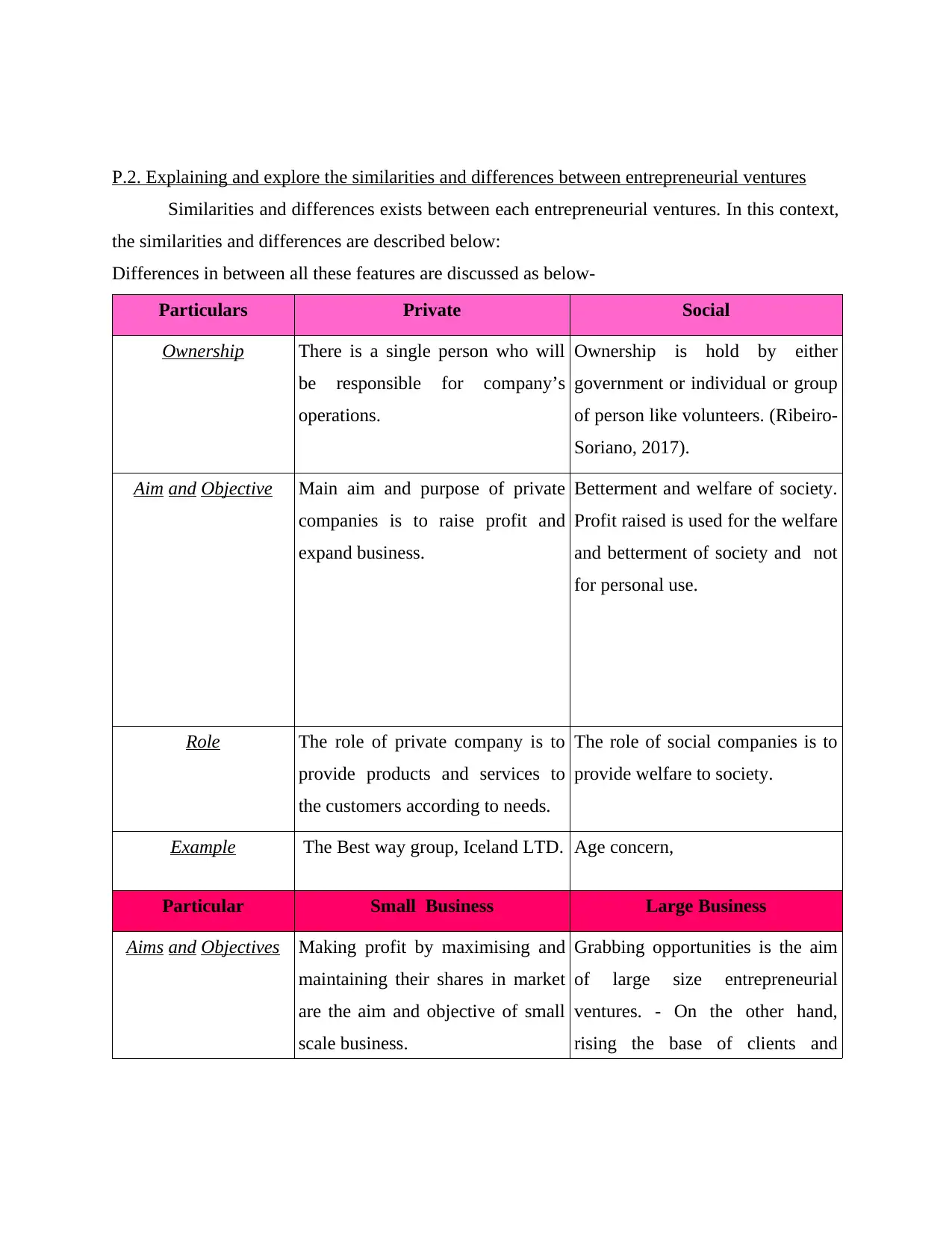
P.2. Explaining and explore the similarities and differences between entrepreneurial ventures
Similarities and differences exists between each entrepreneurial ventures. In this context,
the similarities and differences are described below:
Differences in between all these features are discussed as below-
Particulars Private Social
Ownership There is a single person who will
be responsible for company’s
operations.
Ownership is hold by either
government or individual or group
of person like volunteers. (Ribeiro-
Soriano, 2017).
Aim and Objective Main aim and purpose of private
companies is to raise profit and
expand business.
Betterment and welfare of society.
Profit raised is used for the welfare
and betterment of society and not
for personal use.
Role The role of private company is to
provide products and services to
the customers according to needs.
The role of social companies is to
provide welfare to society.
Example The Best way group, Iceland LTD. Age concern,
Particular Small Business Large Business
Aims and Objectives Making profit by maximising and
maintaining their shares in market
are the aim and objective of small
scale business.
Grabbing opportunities is the aim
of large size entrepreneurial
ventures. - On the other hand,
rising the base of clients and
Similarities and differences exists between each entrepreneurial ventures. In this context,
the similarities and differences are described below:
Differences in between all these features are discussed as below-
Particulars Private Social
Ownership There is a single person who will
be responsible for company’s
operations.
Ownership is hold by either
government or individual or group
of person like volunteers. (Ribeiro-
Soriano, 2017).
Aim and Objective Main aim and purpose of private
companies is to raise profit and
expand business.
Betterment and welfare of society.
Profit raised is used for the welfare
and betterment of society and not
for personal use.
Role The role of private company is to
provide products and services to
the customers according to needs.
The role of social companies is to
provide welfare to society.
Example The Best way group, Iceland LTD. Age concern,
Particular Small Business Large Business
Aims and Objectives Making profit by maximising and
maintaining their shares in market
are the aim and objective of small
scale business.
Grabbing opportunities is the aim
of large size entrepreneurial
ventures. - On the other hand,
rising the base of clients and
⊘ This is a preview!⊘
Do you want full access?
Subscribe today to unlock all pages.

Trusted by 1+ million students worldwide
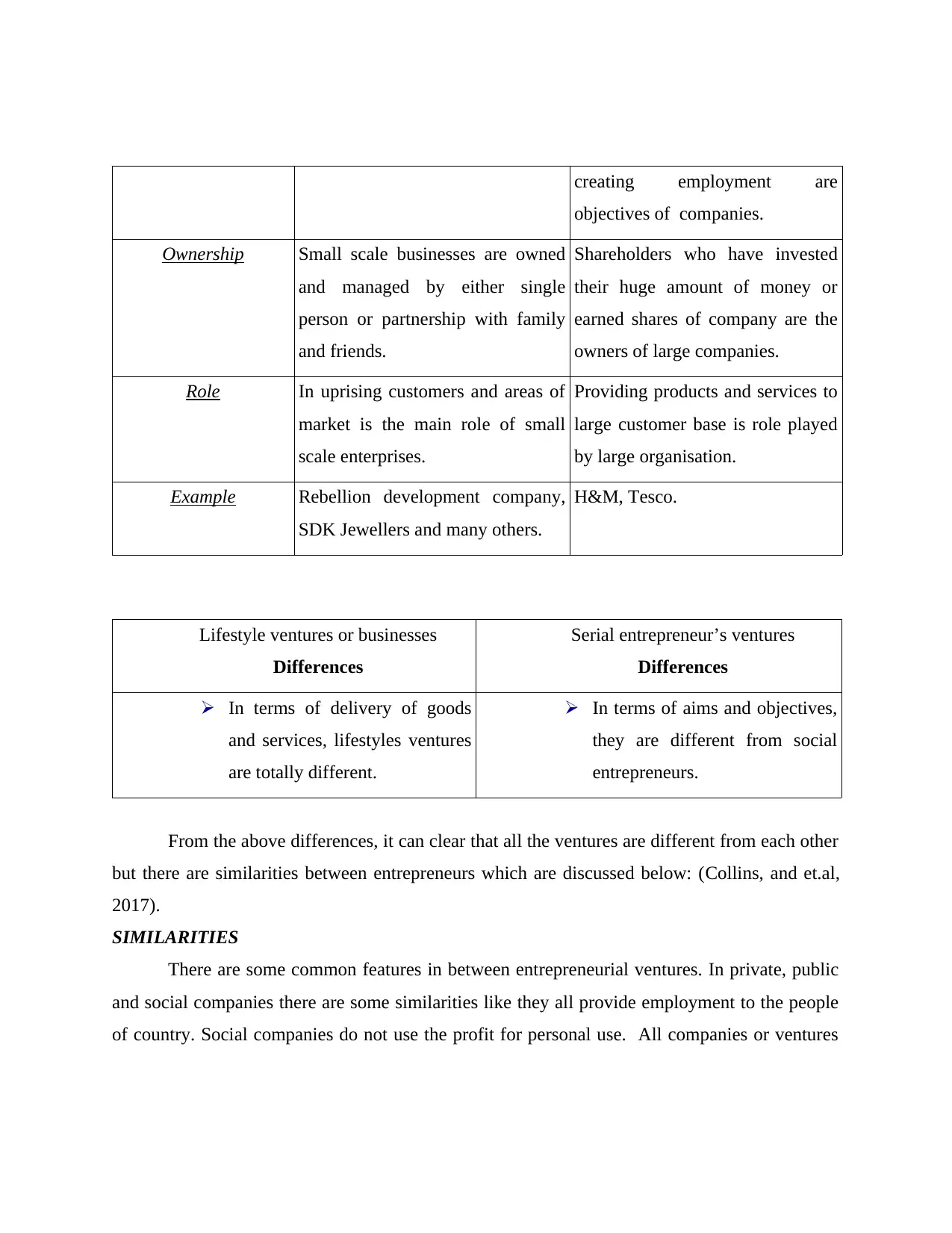
creating employment are
objectives of companies.
Ownership Small scale businesses are owned
and managed by either single
person or partnership with family
and friends.
Shareholders who have invested
their huge amount of money or
earned shares of company are the
owners of large companies.
Role In uprising customers and areas of
market is the main role of small
scale enterprises.
Providing products and services to
large customer base is role played
by large organisation.
Example Rebellion development company,
SDK Jewellers and many others.
H&M, Tesco.
Lifestyle ventures or businesses
Differences
Serial entrepreneur’s ventures
Differences
In terms of delivery of goods
and services, lifestyles ventures
are totally different.
In terms of aims and objectives,
they are different from social
entrepreneurs.
From the above differences, it can clear that all the ventures are different from each other
but there are similarities between entrepreneurs which are discussed below: (Collins, and et.al,
2017).
SIMILARITIES
There are some common features in between entrepreneurial ventures. In private, public
and social companies there are some similarities like they all provide employment to the people
of country. Social companies do not use the profit for personal use. All companies or ventures
objectives of companies.
Ownership Small scale businesses are owned
and managed by either single
person or partnership with family
and friends.
Shareholders who have invested
their huge amount of money or
earned shares of company are the
owners of large companies.
Role In uprising customers and areas of
market is the main role of small
scale enterprises.
Providing products and services to
large customer base is role played
by large organisation.
Example Rebellion development company,
SDK Jewellers and many others.
H&M, Tesco.
Lifestyle ventures or businesses
Differences
Serial entrepreneur’s ventures
Differences
In terms of delivery of goods
and services, lifestyles ventures
are totally different.
In terms of aims and objectives,
they are different from social
entrepreneurs.
From the above differences, it can clear that all the ventures are different from each other
but there are similarities between entrepreneurs which are discussed below: (Collins, and et.al,
2017).
SIMILARITIES
There are some common features in between entrepreneurial ventures. In private, public
and social companies there are some similarities like they all provide employment to the people
of country. Social companies do not use the profit for personal use. All companies or ventures
Paraphrase This Document
Need a fresh take? Get an instant paraphrase of this document with our AI Paraphraser
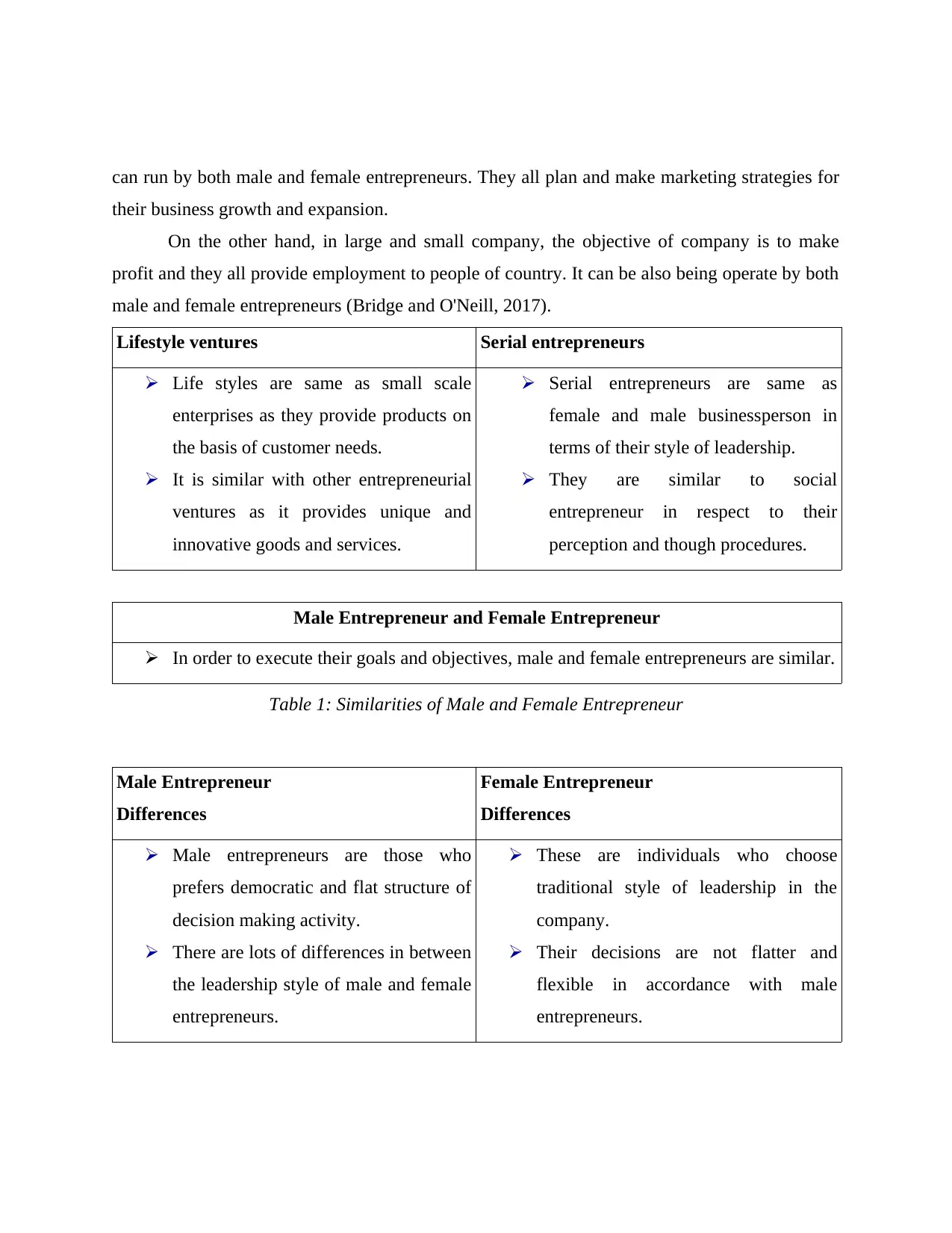
can run by both male and female entrepreneurs. They all plan and make marketing strategies for
their business growth and expansion.
On the other hand, in large and small company, the objective of company is to make
profit and they all provide employment to people of country. It can be also being operate by both
male and female entrepreneurs (Bridge and O'Neill, 2017).
Lifestyle ventures Serial entrepreneurs
Life styles are same as small scale
enterprises as they provide products on
the basis of customer needs.
It is similar with other entrepreneurial
ventures as it provides unique and
innovative goods and services.
Serial entrepreneurs are same as
female and male businessperson in
terms of their style of leadership.
They are similar to social
entrepreneur in respect to their
perception and though procedures.
Male Entrepreneur and Female Entrepreneur
In order to execute their goals and objectives, male and female entrepreneurs are similar.
Table 1: Similarities of Male and Female Entrepreneur
Male Entrepreneur
Differences
Female Entrepreneur
Differences
Male entrepreneurs are those who
prefers democratic and flat structure of
decision making activity.
There are lots of differences in between
the leadership style of male and female
entrepreneurs.
These are individuals who choose
traditional style of leadership in the
company.
Their decisions are not flatter and
flexible in accordance with male
entrepreneurs.
their business growth and expansion.
On the other hand, in large and small company, the objective of company is to make
profit and they all provide employment to people of country. It can be also being operate by both
male and female entrepreneurs (Bridge and O'Neill, 2017).
Lifestyle ventures Serial entrepreneurs
Life styles are same as small scale
enterprises as they provide products on
the basis of customer needs.
It is similar with other entrepreneurial
ventures as it provides unique and
innovative goods and services.
Serial entrepreneurs are same as
female and male businessperson in
terms of their style of leadership.
They are similar to social
entrepreneur in respect to their
perception and though procedures.
Male Entrepreneur and Female Entrepreneur
In order to execute their goals and objectives, male and female entrepreneurs are similar.
Table 1: Similarities of Male and Female Entrepreneur
Male Entrepreneur
Differences
Female Entrepreneur
Differences
Male entrepreneurs are those who
prefers democratic and flat structure of
decision making activity.
There are lots of differences in between
the leadership style of male and female
entrepreneurs.
These are individuals who choose
traditional style of leadership in the
company.
Their decisions are not flatter and
flexible in accordance with male
entrepreneurs.

Examples- Bill Gates. Richard
Branson.
Example- JK Rowling.
Branson.
Example- JK Rowling.
⊘ This is a preview!⊘
Do you want full access?
Subscribe today to unlock all pages.

Trusted by 1+ million students worldwide
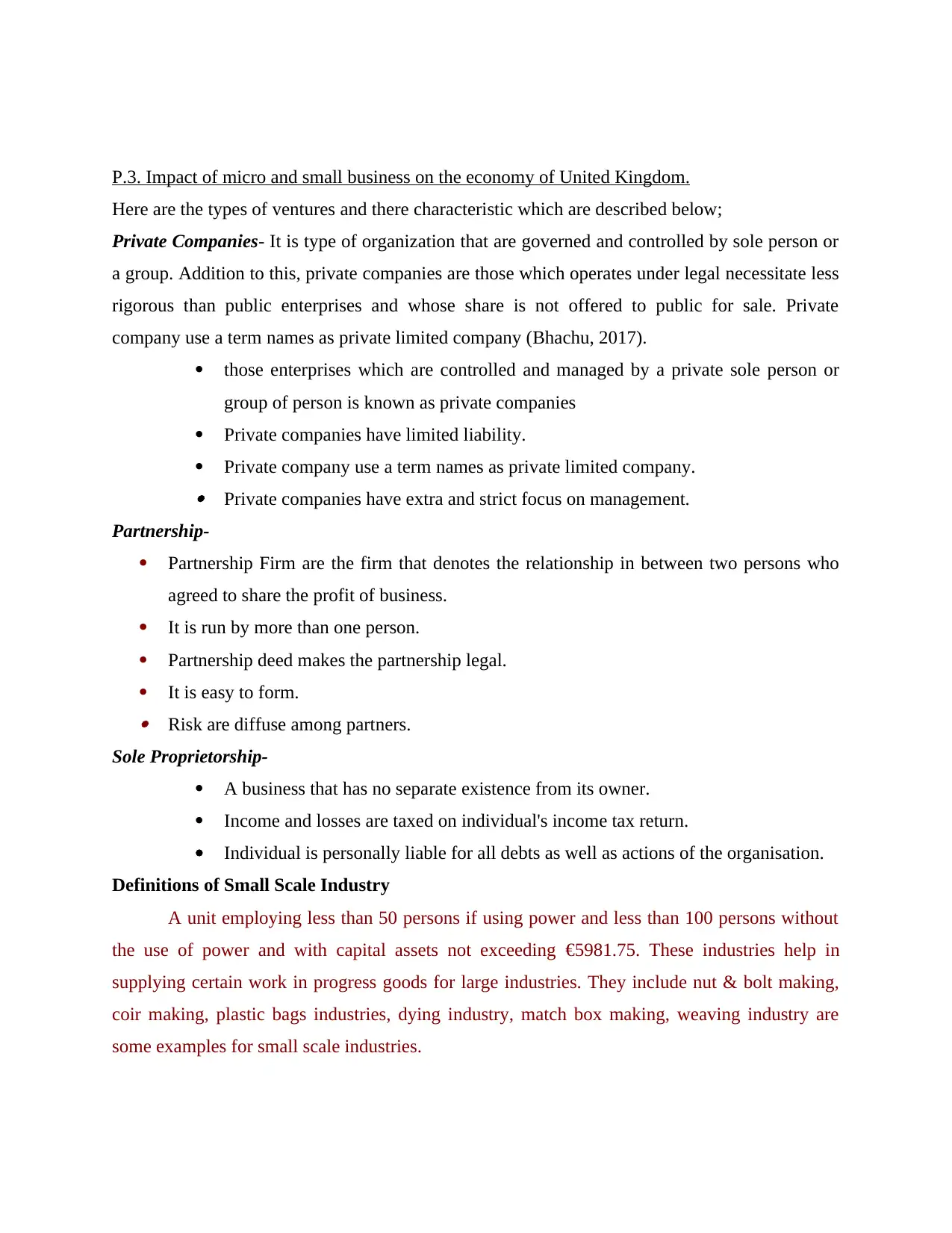
P.3. Impact of micro and small business on the economy of United Kingdom.
Here are the types of ventures and there characteristic which are described below;
Private Companies- It is type of organization that are governed and controlled by sole person or
a group. Addition to this, private companies are those which operates under legal necessitate less
rigorous than public enterprises and whose share is not offered to public for sale. Private
company use a term names as private limited company (Bhachu, 2017).
those enterprises which are controlled and managed by a private sole person or
group of person is known as private companies
Private companies have limited liability.
Private company use a term names as private limited company.
Private companies have extra and strict focus on management.
Partnership-
Partnership Firm are the firm that denotes the relationship in between two persons who
agreed to share the profit of business.
It is run by more than one person.
Partnership deed makes the partnership legal.
It is easy to form. Risk are diffuse among partners.
Sole Proprietorship-
A business that has no separate existence from its owner.
Income and losses are taxed on individual's income tax return.
Individual is personally liable for all debts as well as actions of the organisation.
Definitions of Small Scale Industry
A unit employing less than 50 persons if using power and less than 100 persons without
the use of power and with capital assets not exceeding €5981.75. These industries help in
supplying certain work in progress goods for large industries. They include nut & bolt making,
coir making, plastic bags industries, dying industry, match box making, weaving industry are
some examples for small scale industries.
Here are the types of ventures and there characteristic which are described below;
Private Companies- It is type of organization that are governed and controlled by sole person or
a group. Addition to this, private companies are those which operates under legal necessitate less
rigorous than public enterprises and whose share is not offered to public for sale. Private
company use a term names as private limited company (Bhachu, 2017).
those enterprises which are controlled and managed by a private sole person or
group of person is known as private companies
Private companies have limited liability.
Private company use a term names as private limited company.
Private companies have extra and strict focus on management.
Partnership-
Partnership Firm are the firm that denotes the relationship in between two persons who
agreed to share the profit of business.
It is run by more than one person.
Partnership deed makes the partnership legal.
It is easy to form. Risk are diffuse among partners.
Sole Proprietorship-
A business that has no separate existence from its owner.
Income and losses are taxed on individual's income tax return.
Individual is personally liable for all debts as well as actions of the organisation.
Definitions of Small Scale Industry
A unit employing less than 50 persons if using power and less than 100 persons without
the use of power and with capital assets not exceeding €5981.75. These industries help in
supplying certain work in progress goods for large industries. They include nut & bolt making,
coir making, plastic bags industries, dying industry, match box making, weaving industry are
some examples for small scale industries.
Paraphrase This Document
Need a fresh take? Get an instant paraphrase of this document with our AI Paraphraser
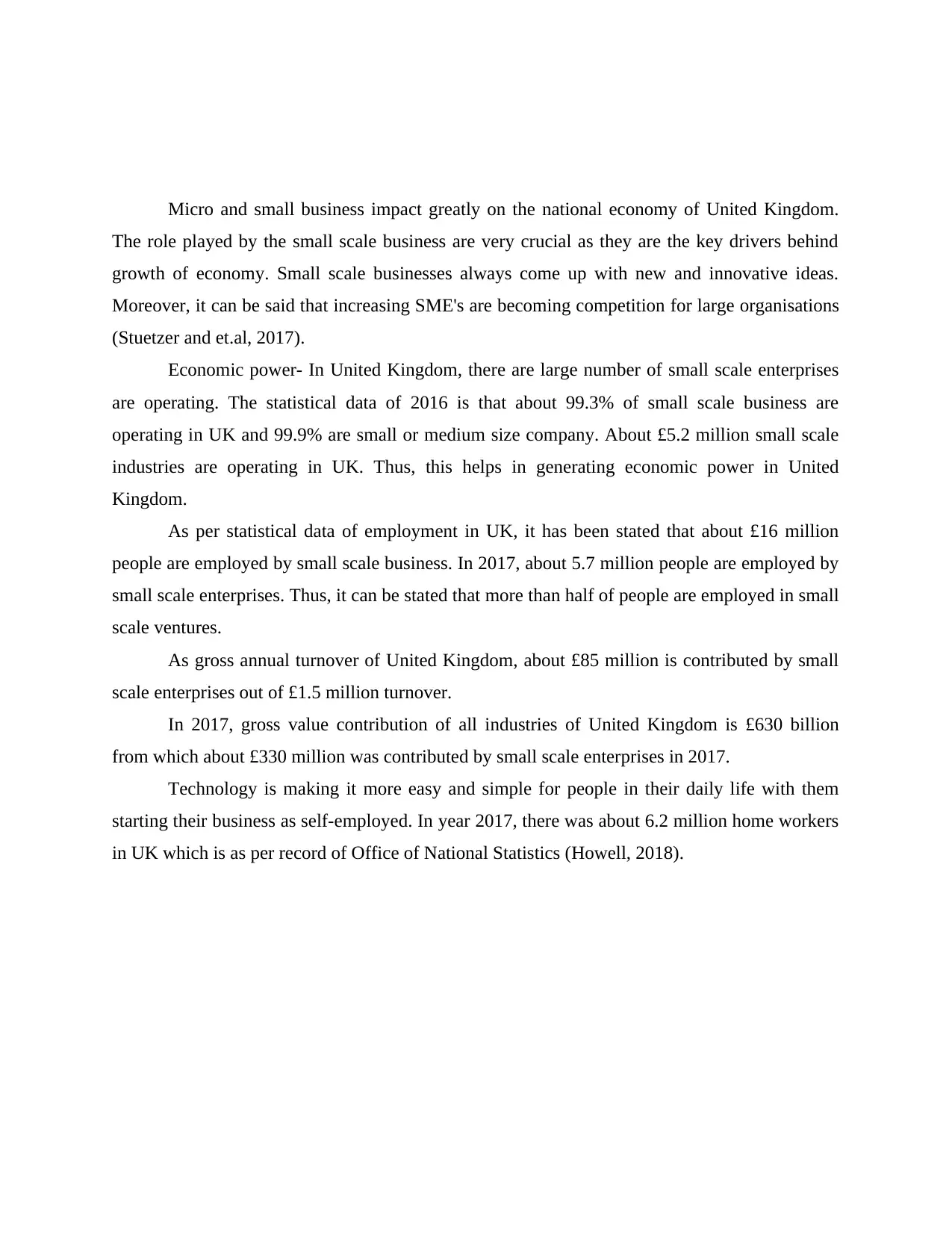
Micro and small business impact greatly on the national economy of United Kingdom.
The role played by the small scale business are very crucial as they are the key drivers behind
growth of economy. Small scale businesses always come up with new and innovative ideas.
Moreover, it can be said that increasing SME's are becoming competition for large organisations
(Stuetzer and et.al, 2017).
Economic power- In United Kingdom, there are large number of small scale enterprises
are operating. The statistical data of 2016 is that about 99.3% of small scale business are
operating in UK and 99.9% are small or medium size company. About £5.2 million small scale
industries are operating in UK. Thus, this helps in generating economic power in United
Kingdom.
As per statistical data of employment in UK, it has been stated that about £16 million
people are employed by small scale business. In 2017, about 5.7 million people are employed by
small scale enterprises. Thus, it can be stated that more than half of people are employed in small
scale ventures.
As gross annual turnover of United Kingdom, about £85 million is contributed by small
scale enterprises out of £1.5 million turnover.
In 2017, gross value contribution of all industries of United Kingdom is £630 billion
from which about £330 million was contributed by small scale enterprises in 2017.
Technology is making it more easy and simple for people in their daily life with them
starting their business as self-employed. In year 2017, there was about 6.2 million home workers
in UK which is as per record of Office of National Statistics (Howell, 2018).
The role played by the small scale business are very crucial as they are the key drivers behind
growth of economy. Small scale businesses always come up with new and innovative ideas.
Moreover, it can be said that increasing SME's are becoming competition for large organisations
(Stuetzer and et.al, 2017).
Economic power- In United Kingdom, there are large number of small scale enterprises
are operating. The statistical data of 2016 is that about 99.3% of small scale business are
operating in UK and 99.9% are small or medium size company. About £5.2 million small scale
industries are operating in UK. Thus, this helps in generating economic power in United
Kingdom.
As per statistical data of employment in UK, it has been stated that about £16 million
people are employed by small scale business. In 2017, about 5.7 million people are employed by
small scale enterprises. Thus, it can be stated that more than half of people are employed in small
scale ventures.
As gross annual turnover of United Kingdom, about £85 million is contributed by small
scale enterprises out of £1.5 million turnover.
In 2017, gross value contribution of all industries of United Kingdom is £630 billion
from which about £330 million was contributed by small scale enterprises in 2017.
Technology is making it more easy and simple for people in their daily life with them
starting their business as self-employed. In year 2017, there was about 6.2 million home workers
in UK which is as per record of Office of National Statistics (Howell, 2018).
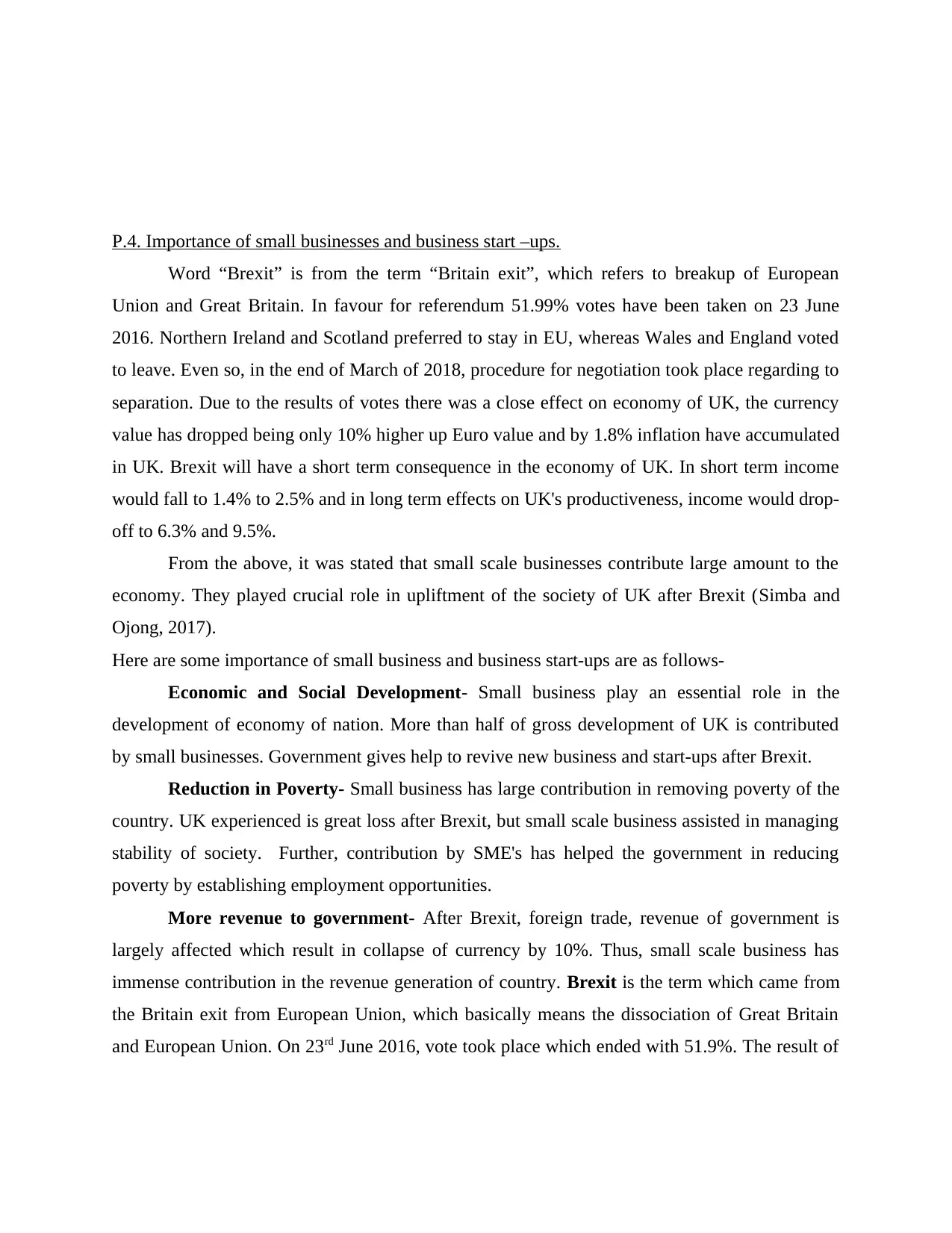
P.4. Importance of small businesses and business start –ups.
Word “Brexit” is from the term “Britain exit”, which refers to breakup of European
Union and Great Britain. In favour for referendum 51.99% votes have been taken on 23 June
2016. Northern Ireland and Scotland preferred to stay in EU, whereas Wales and England voted
to leave. Even so, in the end of March of 2018, procedure for negotiation took place regarding to
separation. Due to the results of votes there was a close effect on economy of UK, the currency
value has dropped being only 10% higher up Euro value and by 1.8% inflation have accumulated
in UK. Brexit will have a short term consequence in the economy of UK. In short term income
would fall to 1.4% to 2.5% and in long term effects on UK's productiveness, income would drop-
off to 6.3% and 9.5%.
From the above, it was stated that small scale businesses contribute large amount to the
economy. They played crucial role in upliftment of the society of UK after Brexit (Simba and
Ojong, 2017).
Here are some importance of small business and business start-ups are as follows-
Economic and Social Development- Small business play an essential role in the
development of economy of nation. More than half of gross development of UK is contributed
by small businesses. Government gives help to revive new business and start-ups after Brexit.
Reduction in Poverty- Small business has large contribution in removing poverty of the
country. UK experienced is great loss after Brexit, but small scale business assisted in managing
stability of society. Further, contribution by SME's has helped the government in reducing
poverty by establishing employment opportunities.
More revenue to government- After Brexit, foreign trade, revenue of government is
largely affected which result in collapse of currency by 10%. Thus, small scale business has
immense contribution in the revenue generation of country. Brexit is the term which came from
the Britain exit from European Union, which basically means the dissociation of Great Britain
and European Union. On 23rd June 2016, vote took place which ended with 51.9%. The result of
Word “Brexit” is from the term “Britain exit”, which refers to breakup of European
Union and Great Britain. In favour for referendum 51.99% votes have been taken on 23 June
2016. Northern Ireland and Scotland preferred to stay in EU, whereas Wales and England voted
to leave. Even so, in the end of March of 2018, procedure for negotiation took place regarding to
separation. Due to the results of votes there was a close effect on economy of UK, the currency
value has dropped being only 10% higher up Euro value and by 1.8% inflation have accumulated
in UK. Brexit will have a short term consequence in the economy of UK. In short term income
would fall to 1.4% to 2.5% and in long term effects on UK's productiveness, income would drop-
off to 6.3% and 9.5%.
From the above, it was stated that small scale businesses contribute large amount to the
economy. They played crucial role in upliftment of the society of UK after Brexit (Simba and
Ojong, 2017).
Here are some importance of small business and business start-ups are as follows-
Economic and Social Development- Small business play an essential role in the
development of economy of nation. More than half of gross development of UK is contributed
by small businesses. Government gives help to revive new business and start-ups after Brexit.
Reduction in Poverty- Small business has large contribution in removing poverty of the
country. UK experienced is great loss after Brexit, but small scale business assisted in managing
stability of society. Further, contribution by SME's has helped the government in reducing
poverty by establishing employment opportunities.
More revenue to government- After Brexit, foreign trade, revenue of government is
largely affected which result in collapse of currency by 10%. Thus, small scale business has
immense contribution in the revenue generation of country. Brexit is the term which came from
the Britain exit from European Union, which basically means the dissociation of Great Britain
and European Union. On 23rd June 2016, vote took place which ended with 51.9%. The result of
⊘ This is a preview!⊘
Do you want full access?
Subscribe today to unlock all pages.

Trusted by 1+ million students worldwide
1 out of 19
Related Documents
Your All-in-One AI-Powered Toolkit for Academic Success.
+13062052269
info@desklib.com
Available 24*7 on WhatsApp / Email
![[object Object]](/_next/static/media/star-bottom.7253800d.svg)
Unlock your academic potential
Copyright © 2020–2026 A2Z Services. All Rights Reserved. Developed and managed by ZUCOL.





